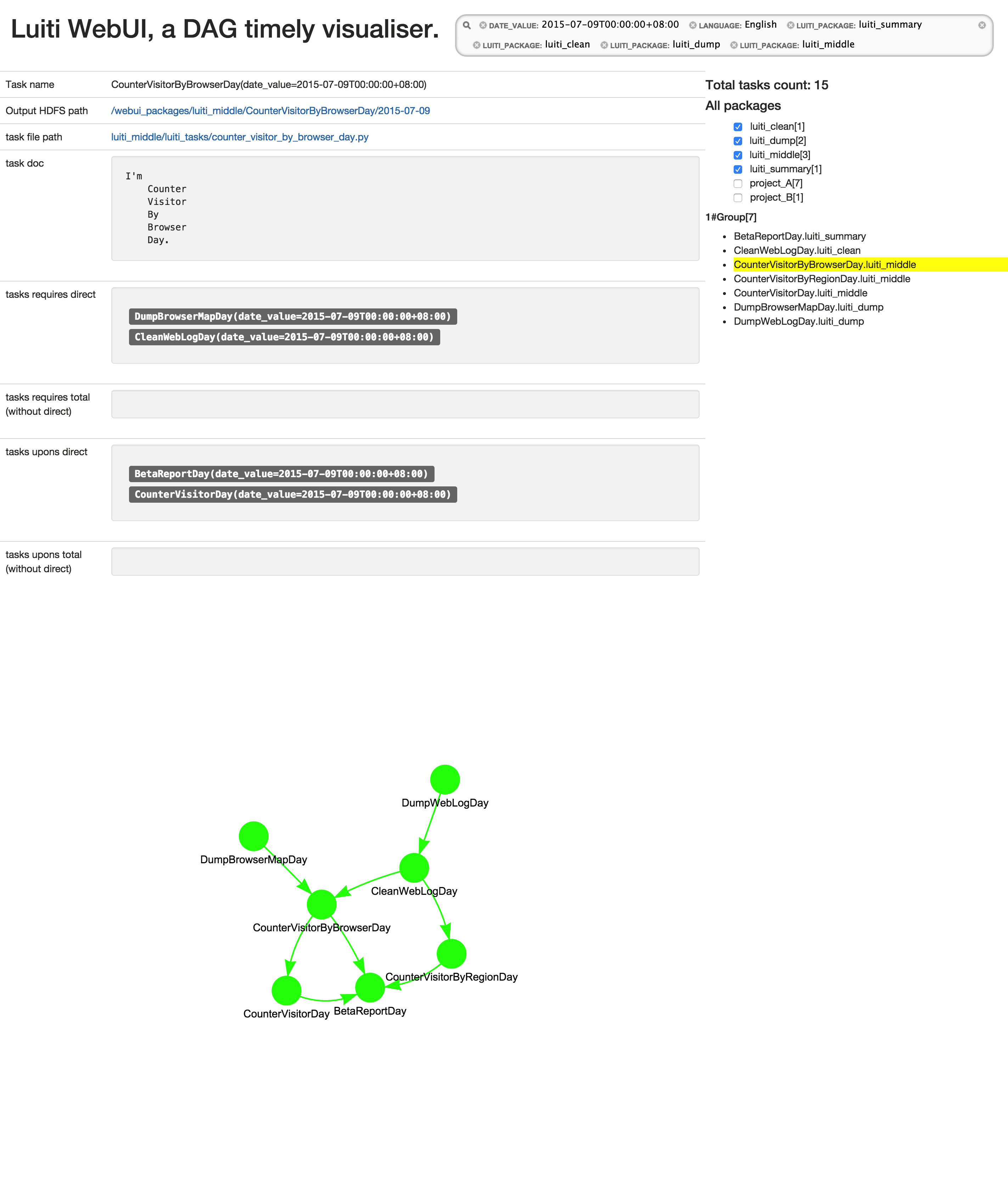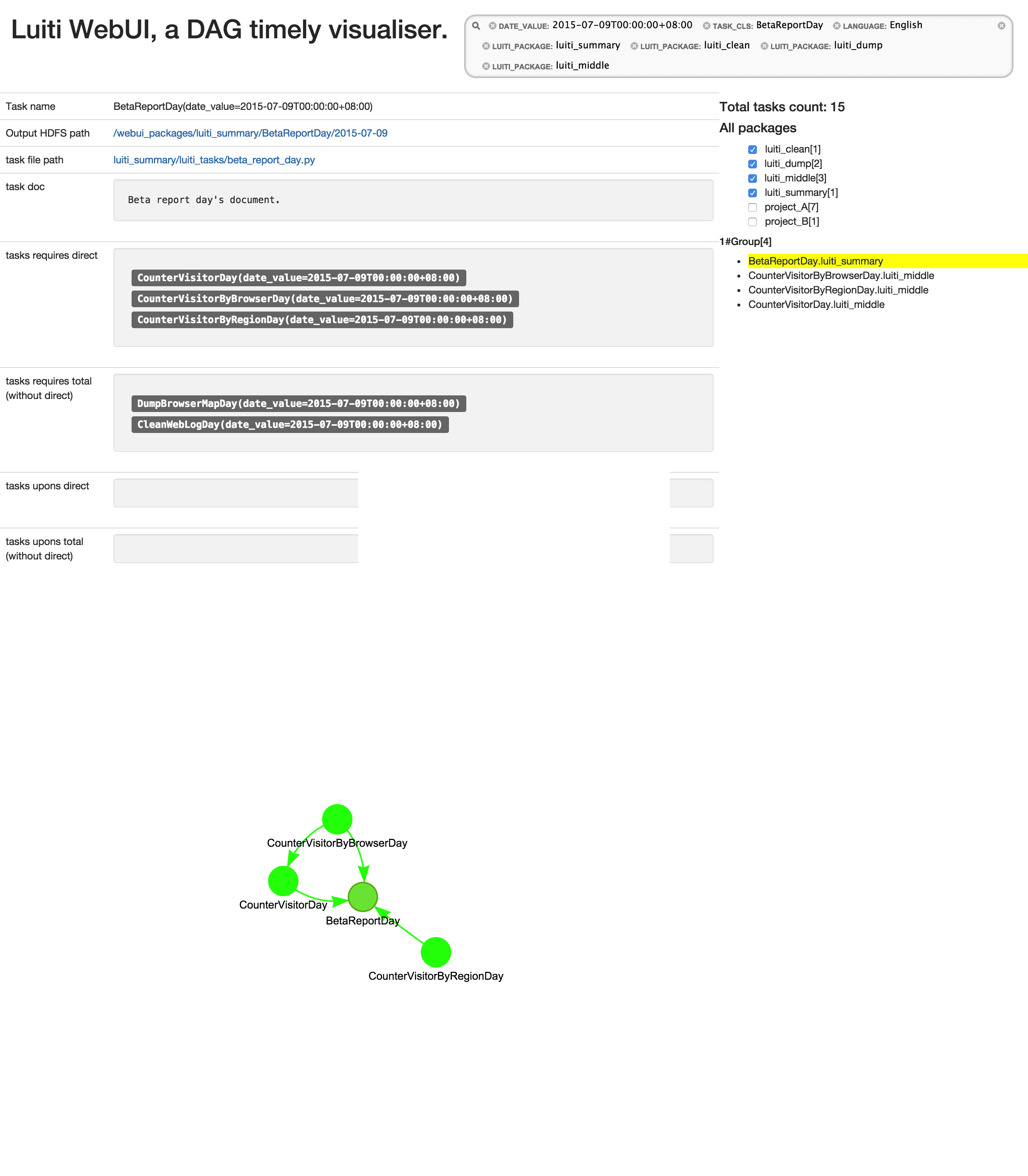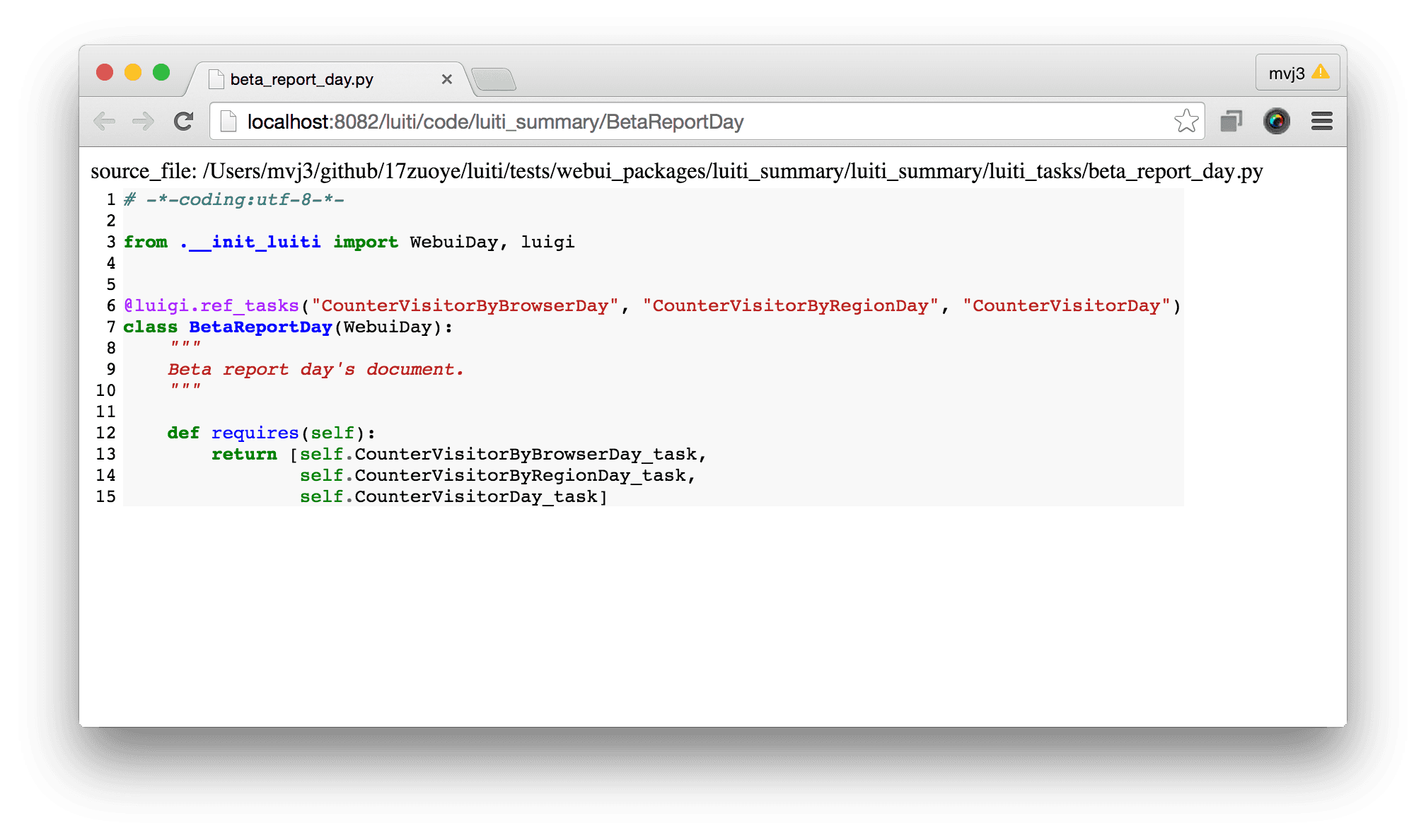As Luigi's homepage said, it's "a Python module that helps you build complex pipelines of batch jobs. It handles dependency resolution, workflow management, visualization etc. It also comes with Hadoop support built in."
Luiti is built on top of Luigi, separates all your tasks into multiple
packages, and forces one task per one Python file. Luiti task classes
can be managed by the luiti command, supported operations are ls, new,
generate, info, clean, run, and webui.
Luiti is born to build a layered database warehouse, corresponding to the different packages we just mentioned. A data warehouse consists of synced data sources, fact tables, dimension tables, regular or temporary business reports.
The essence of batching processing system is to separate a large task into small tasks, and the essence of business report is that a daily report or a weekly report is required, so here comes TaskDay, TaskWeek, and more. Task classes also have a Hadoop version, such as TaskDayHadoop, TaskWeekHadoop, and so on.
You can pass any parameters into Luigi's tasks, but Luiti recommend you
to pass only date_value parameter. So you can run Luiti tasks
periodically, e.g. hourly, daily, weekly, etc. luiti = luigi + time.
- Intro
- Luiti command tool
- Luiti WebUI screenshots
- Core concepts based on time management
- Built-in properties
- Manage multiple projects in luiti
- A simple guide to Luigi
- A simple example in luiti
- Installment and Development
- Task recommendation
- Task decorators
- MapReduce related
- Extend luiti
- FAQ
- Run tests
- Who uses Luiti?
Keynote Luiti - An Offline Task Management Framework
After installed package, you can use luiti command tool that contained
in the package.
$ luiti
usage: luiti [-h] {ls,new,generate,info,clean,run,webui} ...
Luiti tasks manager.
Optional arguments:
-h, --help show this help message and exit
Subcommands:
valid subcommands
{ls,new,generate,info,clean,run,webui}
ls list all current luiti tasks.
new create a new luiti project.
generate generate a new luiti task python file.
info show a detailed task.
clean manage files that outputed by luiti tasks.
run run a luiti task.
webui start a luiti DAG visualizer.
./example_webui_run.py
# or
luiti webui --project-dir your_main_luiti_package_pathHere's some screenshots from example_webui_run.py, just to give you an idea of how luiti's multiple Python packages works.
- TaskBase (luigi.Task)
- TaskHour (TaskBase)
- TaskDay (TaskBase)
- TaskWeek (TaskBase)
- TaskMonth (TaskBase)
- TaskRange (TaskBase)
You can extend more date type by subclass TaskBase, and make sure the
date types are added in TaskBase.DateTypes too.
- TaskDayHadoop (luigi.hadoop.HadoopExt, TaskDay)
- TaskWeekHadoop (luigi.hadoop.HadoopExt, TaskWeek)
- TaskRangeHadoop (luigi.hadoop.HadoopExt, TaskRange)
- RootTask (luigi.Task)
- StaticFile (luigi.Task)
- MongoImportTask (TaskBase) # export json file from hdfs to mongodb.
- One Task class per file.
- Task class should be camel case ( e.g.
EnglishStudentAllExamWeek), file name should be low case with underscore ( e.g.english_student_all_exam_week.py). - Task files should be under the directory of
luiti_tasks. luiti use this convertion to linking tasks inner and outer of packages. - Task class name should be ended with date type, e.g. Day, Week, etc. Please refer to
TaskBase.DateTypes.
date_value. Required, even it's a Range type Task. This ensure thatoutputwill be written to a day directory.data_file. The absolute output file path, it's a string format.data_dir. The directory of the absolute output file path, it's a string format.root_dir. The root path of this package.data_fileanddata_dirare all under it.output. Basic Task's output class is LocalTarget, and Hadoop Task's output class is hdfs.HdfsTarget.date_str. A datetime string, such as "20140901".date_type. A string that generated from task class name, e.g. Day, Week, etc.date_value_by_type_in_last. If current date type is Week, and it'll return the previous week'sdate_value.date_value_by_type_in_begin. If current date type is Week, and it'll return Monday zero clock in the current week.date_value_by_type_in_end. If current date type is Week, and it'll return Sunday 11:59:59 clock in the current week.pre_task_by_self. Usually it returns previous task in the current date type. If reaches the time boundary of current date type, it returns RootTask.is_reach_the_edge. It's semester at 17zuoye business.instances_by_date_range. Class function, return all task instances list that belongs to current date range.task_class. Return current task class.
We recommend you to organize every project's directory structure as the below form, and it means it's also a normal Python package, for example:
project_A --- project directory
setup.py --- Python package install script
README.markdown --- project README
project_A/ --- Python package install directory
├── __init__.py --- mark current directories on disk as a Python package directories
└── luiti_tasks --- a directory name which indicates it contains several luiti tasks
├── __init__.py --- mark current directories on disk as a Python package directories
├── __init_luiti.py --- initialize luiti environment variables
├── exam_logs_english_app_day.py --- an example luiti task
├── ..._day.py --- another example luiti task
└── templates --- some libraries
├── __init__.py
└── ..._template.py
After installing luiti, you can run following command line to generate
a project like above.
luiti new --project-name project_AIf other luiti projects need to use this package, and you need to
install this package, to make sure luiti could find them in the
search path (sys.path) of Python modules.
Every luiti projects share the same structure, e.g.
project_A/luiti_tasks/another_feature_day.py. After config
luigi.plug_packages("project_B", "project_C==0.0.2"]) in
__init_luiti.py, you can use @luigi.ref_tasks("ArtistStreamDay') to
indicate current Task to find ArtistStreamDay Task in current package
project_A, or related project_B, project_C packages.
Luigi's core concept is to force you to separate a big task into many small tasks, and they're linked by atomic Input and Output. Luigi contains four parts mainly:
- Output. It must be implemented in
outputfunction, such asLocalTargetandhdfs.HdfsTarget. - Input. It must be implemented in
requiresfunction, and the function is supposed to return some or None task instances. - Parameters. Parameters should be inherited from
luigi.Parameter, e.g.DateParameter, etc. - Execute Logic. Use
runfunction if running at local, ormapperandreducerif running on a distributed MapReduce YARN.
After finish the business logic implementation and test cases, You can
submit your task to the luigid background daemon. luigid will
process task dependencies automatically, this is done by checking
output is already exists (It's the Target class's function). And
luigi will guarantee that task instances are unique in current
luigid background process by the task class name and parameters.
Code below is copied from http://luigi.readthedocs.org/en/latest/example_top_artists.html
import luigi
from collections import defaultdict
class AggregateArtists(luigi.Task):
date_interval = luigi.DateIntervalParameter()
def output(self):
return luigi.LocalTarget("/data/artist_streams_%s.tsv" % self.date_interval)
def requires(self):
return [Streams(date) for date in self.date_interval]
def run(self):
artist_count = defaultdict(int)
for input in self.input():
with input.open('r') as in_file:
for line in in_file:
timestamp, artist, track = line.strip().split()
artist_count[artist] += 1
with self.output().open('w') as out_file:
for artist, count in artist_count.iteritems():
print >> out_file, artist, count- First file:
artist_project/luiti_tasks/artist_stream_day.py
from luiti import *
class ArtistStreamDay(StaticFile):
@cached_property
def filepath(self):
return TargetUtils.hdfs("/tmp/streams_%s.tsv" % self.date_str- Second file:
artist_project/luiti_tasks/aggregate_artists_week.py
from luiti import *
@luigi.ref_tasks("ArtistStreamDay')
class AggregateArtistsWeek(TaskWeek):
def requires(self):
return [self.ArtistStreamDay(d1) for d1 in self.days_in_week]
def output(self):
return TargetUtils.hdfs("/data/artist_streams_%s.tsv" % self.date_str
def run(self):
artist_count = defaultdict(int)
for file1 in self.input():
for line2 in TargetUtils.line_read(file1):
timestamp, artist, track = line.strip().split()
artist_count[artist] += 1
with self.output().open('w') as out_file:
for artist, count in artist_count.iteritems():
print >> out_file, artist, countOptimization notes:
- luiti's task class is built in with
date_valueproperty, and converted intoArrowdata type. - In ArtistStreamDay,
date_stris transformed fromdate_value, and converted from a function into a instance property after the first call. @luigi.ref_tasksbind ArtistStreamDay as AggregateArtistsWeek's instance property, so we can useself.ArtistStreamDay(d1)form to instantiate some task instances.- After AggregateArtistsWeek is inherited from
TaskWeek, it'll hasself.days_in_weekproperty automatically. TargetUtils.line_readreplaced original function that needs two lines codes to complete the feature, and return a Generator directly.
- MapReduce file:
artist_project/luiti_tasks/aggregate_artists_week.py
from luiti import *
@luigi.ref_tasks("ArtistStreamDay')
class AggregateArtistsWeek(TaskWeekHadoop):
def requires(self):
return [self.ArtistStreamDay(d1) for d1 in self.days_in_week]
def output(self):
return TargetUtils.hdfs("/data/weeks/artist_streams_%s.tsv" % self.date_str
def mapper(self, line1):
timestamp, artist, track = line.strip().split()
yield artist, 1
def reducer(self, artist, counts):
yield artist, len(counts)Yes, it's almost no difference to luigi, except the self.days_in_week
property and @luigi.ref_tasks decorator.
pip install luitiOr lastest source code
git clone https://github.com/luiti/luiti.git
cd luiti
python setup.py installThe time library is Arrow , every Task
instance's date_value property is a arrow.Arrow type.
luiti will convert date parameters into local time zone automatically. If
you want to customize time, please prefer to use
ArrowParameter.get(*strs) and ArrowParameter.now() to make sure you
use the local time zone.
We highly recommend you to use cached_property, like
werkzeug said, "A decorator that
converts a function into a lazy property. The function wrapped is called
the first time to retrieve the result and then that calculated result is
used the next time you access the value".
This function is heavily used in 17zuoye every day, we use it to cache lots of things, such as a big data dict.
class AnotherBussinessDay(TaskDayHadoop):
def requires(self):
return [task1, task2, ...]
def mapper(self, line1):
k1, v1 = process(line1)
yield k1, v1
def reducer(self, k1, vs1):
for v1 in vs1:
v2 = func2(v1, self.another_dict)
yield k1, v2
@cached_property
def another_dict(self):
# lots of cpu/io
return big_dict- Basic utilities, such as os, re, json, defaultdict, etc.
- Date processing utilities, they are arrow, ArrowParameter.
- Cache utilities,
cached_property. - Other utilities, such as IOUtils, DateUtils, TargetUtils, HDFSUtils, MRUtils, MathUtils, CommandUtils, CompressUtils.
# 1. Bind related tasks lazily, and can be used as instance property directly.
@luigi.ref_tasks(*tasks)
# 2. Support multiple file output in MapReduce
@luigi.multiple_text_files()
# 3. Run MapReduce in local mode by only add one decorator.
@luigi.mr_local()
# 4. Check current task' data source's date range is satisfied.
@luigi.check_date_range()
# 5. Check current task can be runned in current date range.
@luigi.check_runtime_range(hour_num=[4,5,6], weekday_num=[1])
# 6. Let Task Templates under [luigi.contrib](https://github.com/spotify/luigi/tree/master/luigi/contrib) to follow with Luiti's Task convention.
@luigi.as_a_luiti_task()
class AnotherBussinessDay(TaskDayHadoop):
passWhen executing a MR job, luigi will write result to a file with timestamp instantly. If the task successes, then rename to the name that the task's original output file path. If the task fails, then YARN will delete the temporary file automatically.
- Original way.
for line1 in TargetUtils.line_read(hdfs1),line1is an unicode type. - Read by JSON.
for json1 in TargetUtils.json_read(hdfs1),json1is a valid Python object. - Read in a K-V format.
for k1, v1 in TargetUtils.mr_read(hdfs1),k1is an unicode type, andv1is a Python object.
We recommend to use TargetUtils.hdfs(path1). This function compacts
the MR file result data format that consists of "part-00000" file blocks.
- Add MapReduce input and output to
mrtest_inputandmrtest_output, these mimic the MapReduce processing. - In your test file, use
@MrTestCaseto decorator your test class, and add your task class tomr_task_nameslist. - (Optional) Add some config dict to
mrtest_attrsto mimic properties that generated in production mode. - Run your test cases!
buy_fruit_day.py
from luiti import *
class BuyFruitDay(TaskDayHadoop):
def requries(self):
...
def output(self):
...
def mapper(self, line):
...
yield uid, fruit
def reducer(self, uid, fruits):
price = sum([self.price_dict[fruit] for fruit in fruits])
yield "", MRUtils.str_dump({"uid": uid, "price": price})
@cache_property
def price_dict(self):
result = dict()
for json1 in TargetUtils.json_read(a_fruit_price_list_file):
result[json1["name"]] = json1["price"]
return result
def mrtest_input(self):
return """
{"uid": 3, "fruit": "Apple"}
{"uid": 3, "fruit": "Apple"}
{"uid": 3, "fruit": "Banana"}
"""
def mrtest_output(self):
return """
{"uid": 3, "price": 7}
"""
def mrtest_attrs(self):
return {
"price_dict": {
"Apple": 3,
"Banana": 1,
}
}test file
from luiti import MrTestCase
@MrTestCase
class TestMapReduce(unittest.TestCase):
mr_task_names = [
'ClassEnglishAllExamWeek',
...
]
if __name__ == '__main__':
unittest.main()Using TaskBase's builtin extend class function to extend or overwrite
the default properties or functions, for example:
TaskWeek.extend({
'property_1' : lambda self: "property_2",
})extend class function compacts with function, property, cached_property,
or any other attributes at the same time。When you want to overwrite
property and cached_property, you just need a function value, and
extend will automatically convert them into property and
cached_property type.
Q: How atomic file is supported?
A: As luigi's document mentioned that "Simple class that writes to a temp file and moves it on close()
Also cleans up the temp file if close is not invoked", so use the self.input().open("r") or
self.output().open("w") instead of open("some_file", "w").
Q: Can luigi detect the interdependent tasks?
A: It's not question inside of luigi, but it's a question about topological sorting
as a general computer science topic. The task scheduler is implemented at luigi/scheduler.py .
Q: How to pass more parameters into luiti tasks?
A: You can create a key-value dict, date_value is the key, and your
customize parameters are the values.
If you have other unresolved questions, please feel free to ask questions at issues.
nosetests
# or
nosetests --with-coverage --cover-inclusive --cover-package=luiti
tox -e py27-cdh- 17zuoye Luiti born at this company.
Please let us know if your company wants to be featured on this list!
MIT.





